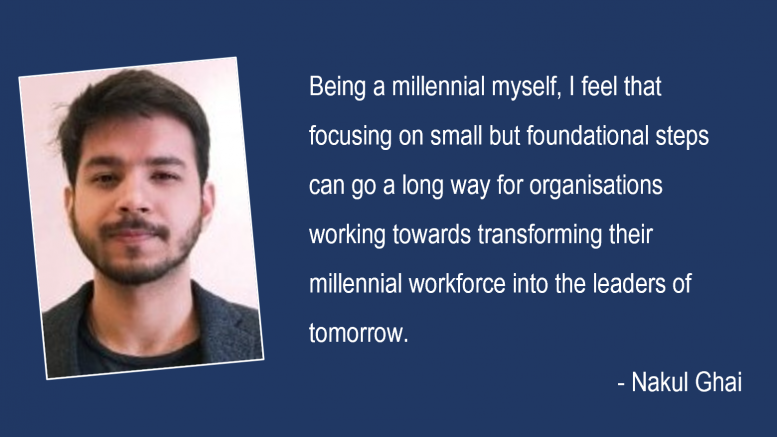There are a lot of newer trends that are emerging in leadership and development and of these, the one that piques my interest the most is the increasing focus on millennials and leadership. Millennials, also known as Generation Y or Gen Y (anyone born between 1981 and 1996 or anyone roughly between the ages of 24 and 39) today can be seen as wielding a lot of influence and authority within and outside organisations. A rising number of millennials are moving past entry-level positions into more senior management roles. We can see millennials coming up with a lot of new career avenues and opportunities each passing day. This can be attributed to the continuous investments, efforts, and time that is being put by this demographic cohort into nurturing both – the hard skills as well as the soft skills.
According to Deloitte’s 2022 recent Gen Z and Millennial Survey, millennials’ top concerns today are financial worries, climate change, mental health challenges, and sexual harassment. This is reflective of the priorities and consciousness of this generation. One can see millennials redefining the ‘culture’ norms at workplaces and making it to the headlines in local dailies and magazines. Now whether it’s good or bad is something debatable. However, one thing is very clear- millennials are coming forward as conscious leaders of tomorrow and are taking continuous steps towards donning the mantle of leadership and casting a positive impact on the business as well as society. On the other hand, responsible organisations are taking more and more efforts towards encouraging and supporting millennial leadership.
Being a millennial myself, I feel that focusing on small but foundational steps can go a long way for organisations working towards transforming their millennial workforce into the leaders of tomorrow.
Continuous Investments in Learning & Development
Learning and development sit at the core of leadership development. Great leaders are always open to learning, and always feel the need to develop one thing or the other. Organisations that focus on continuous investments in learning and development via means of insightful chat sessions, leadership networking events, mobility programs, and upskilling support win the long-term trust and loyalty of the millennial workforce.
Communicating Growth Prospects with Clarity & Precision
In a lot of recent reports and surveys, millennials are being referred as “The Job-Hopping Generation”. If we try to dig deeper, it may occur to us that the trend of job hopping may also stem from the lack of clarity on growth prospects within an organisation or short-sightedness about career outcomes. Organisations can try to curtail this trend by offering millennials a long-term clear-cut growth plan with expectations mapped along with it. This may help millennials make better and more informed career choices and decisions.
Attributing Ownership & Promoting Accountability
Ownership and accountability go hand in hand and the two are complementary to each other. With ownership comes great responsibility as well. To build the future leaders of tomorrow, the leaders at the helm across organisations must encourage passing on the reins of responsibility to this next generation. However, while passing on ownership, an equal focus must be laid on holding millennials accountable for their actions. It is here that the idea of rewards and appreciation comes into play. Appreciation for commitment, hard work, devotion, and sincerity can set millennials on a path to unlocking unprecedented progress and success.
Focus on Diversity & Inclusivity
Gone are the days when diversity and inclusivity were mere buzzwords. Millennials and Gen Zs today are quite passionate about the organisational purpose and tenets and, are interested in knowing an organisation’s roadmap to achieve diversity and inclusion goals. Millennials like the idea of ‘self-identity’, no matter how different it is from the conventional or the stereotypical one. They like the idea of ‘diverse’ coming into life in the flesh and blood and organisations which are inclusive and respectful of this idea are becoming successful in acquiring and retaining the millennial workforce.
Regular Feedback Mechanism
Feedback is an important part of one’s learning and development curve. Without being open to feedback, one limits the possibilities of growth and improvement. It would be wrong to say that millennials are ‘not too open’ to the feedback, however, one can say that they like this feedback to have a sense of consistency and regularity. Organisations must foster a regular feedback mechanism and system in place to help their workforce of the future understand their strengths, their shortcomings, and continuously work on making themselves better. It’s time for organisations and leadership to also go a step further and establish checks on not just what feedback is being given and how it is being given but also how it’s being perceived by the other. The idea of self and other takes a very important place here and it’s important to consider both these aspects carefully.
Last but not the least, the road to leadership is never linear and it is full of bumpy rides. Millennials can never tread on this path all alone. What could help them sail through this is the counsel, guidance, and mentorship of the leaders already in place. It is important for the workforce of tomorrow to seek, depend, and rely on the legacy and experience of senior and experienced leaders while ascending the ladder to becoming the top brass.
The views and opinions published here belong to the author and do not necessarily reflect the views and opinions of the publisher.



Be the first to comment on "How to Build Millennial Leaders within an Organisation?"